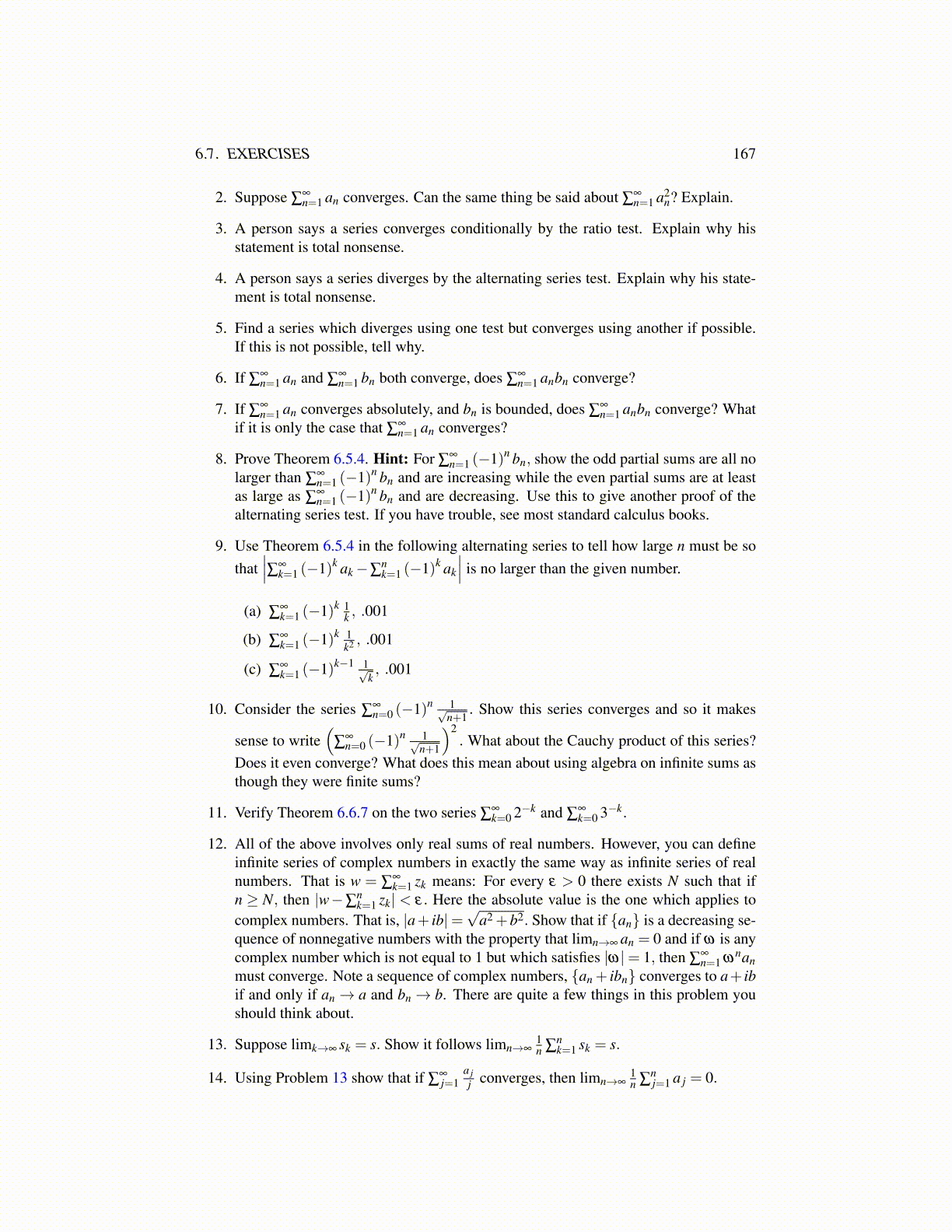
6.7. EXERCISES 167
2. Suppose ∑∞n=1 an converges. Can the same thing be said about ∑
∞n=1 a2
n? Explain.
3. A person says a series converges conditionally by the ratio test. Explain why hisstatement is total nonsense.
4. A person says a series diverges by the alternating series test. Explain why his state-ment is total nonsense.
5. Find a series which diverges using one test but converges using another if possible.If this is not possible, tell why.
6. If ∑∞n=1 an and ∑
∞n=1 bn both converge, does ∑
∞n=1 anbn converge?
7. If ∑∞n=1 an converges absolutely, and bn is bounded, does ∑
∞n=1 anbn converge? What
if it is only the case that ∑∞n=1 an converges?
8. Prove Theorem 6.5.4. Hint: For ∑∞n=1 (−1)n bn, show the odd partial sums are all no
larger than ∑∞n=1 (−1)n bn and are increasing while the even partial sums are at least
as large as ∑∞n=1 (−1)n bn and are decreasing. Use this to give another proof of the
alternating series test. If you have trouble, see most standard calculus books.
9. Use Theorem 6.5.4 in the following alternating series to tell how large n must be sothat
∣∣∣∑∞k=1 (−1)k ak −∑
nk=1 (−1)k ak
∣∣∣ is no larger than the given number.
(a) ∑∞k=1 (−1)k 1
k , .001
(b) ∑∞k=1 (−1)k 1
k2 , .001
(c) ∑∞k=1 (−1)k−1 1√
k, .001
10. Consider the series ∑∞n=0 (−1)n 1√
n+1. Show this series converges and so it makes
sense to write(
∑∞n=0 (−1)n 1√
n+1
)2. What about the Cauchy product of this series?
Does it even converge? What does this mean about using algebra on infinite sums asthough they were finite sums?
11. Verify Theorem 6.6.7 on the two series ∑∞k=0 2−k and ∑
∞k=0 3−k.
12. All of the above involves only real sums of real numbers. However, you can defineinfinite series of complex numbers in exactly the same way as infinite series of realnumbers. That is w = ∑
∞k=1 zk means: For every ε > 0 there exists N such that if
n ≥ N, then |w−∑nk=1 zk| < ε. Here the absolute value is the one which applies to
complex numbers. That is, |a+ ib|=√
a2 +b2. Show that if {an} is a decreasing se-quence of nonnegative numbers with the property that limn→∞ an = 0 and if ω is anycomplex number which is not equal to 1 but which satisfies |ω|= 1, then ∑
∞n=1 ωnan
must converge. Note a sequence of complex numbers, {an + ibn} converges to a+ ibif and only if an → a and bn → b. There are quite a few things in this problem youshould think about.
13. Suppose limk→∞ sk = s. Show it follows limn→∞1n ∑
nk=1 sk = s.
14. Using Problem 13 show that if ∑∞j=1
a jj converges, then limn→∞
1n ∑
nj=1 a j = 0.